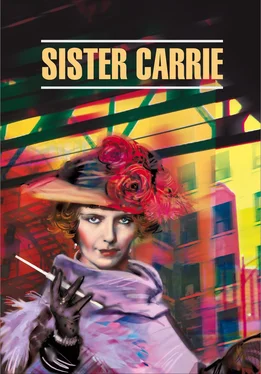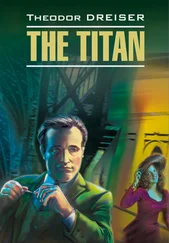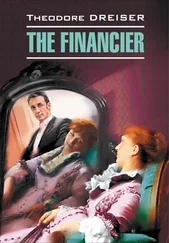The girl next her noticed her state of mind. “Don’t you mind,” she said. “He’s too fresh.” [20] He’s too fresh. – Он ужастный нахал.
Carrie said nothing, but bent over her work. When six o’clock came she hurried eagerly away, her arms aching and her limbs stiff from sitting in one position.
As she passed out along the hall after getting her hat, a young machine hand, attracted by her looks, made bold to jest with her.
“Say, Maggie,” he called, “if you wait, I’ll walk with you.”
It was thrown so straight in her direction that she knew who was meant, but never turned to look.
In the crowded elevator, another dusty, toil-stained youth tried to make an impression on her by leering in her face.
One young man, waiting on the walk outside for the appearance of another, grinned at her as she passed.
“Ain’t going my way, are you?” he called jocosely.
Carrie turned her face to the west with a subdued heart.
As she turned the corner, she saw through the great shiny window the small desk at which she had applied. There were the crowds, hurrying with the same buzz and energy yielding enthusiasm. She felt a slight relief, but it was only at her escape. She felt ashamed in the face of better dressed girls who went by. She felt as though she should be better served, and her heart revolted.
Chapter V
A Glittering Night Flower: The Use of a Name
Drouet did not call that evening. After receiving the letter, he had laid aside all thought of Carrie for the time being and was floating around having what he considered a gay time. On this particular evening he dined at “Rector’s,” a restaurant of some local fame, which occupied a basement at Clark and Monroe Streets. Thereafter he visited the resort of Fitzgerald and Moy’s in Adams Street, opposite the imposing Federal Building. There he leaned over the splendid bar and swallowed a glass of plain whiskey and purchased a couple of cigars, one of which he lighted. This to him represented in part high life – a fair sample of what the whole must be.
Drouet was not a drinker in excess. He was not a moneyed man. He only craved the best, as his mind conceived it, and such doings seemed to him a part of the best. Rector’s, with its polished marble walls and floor, its profusion of lights, its show of china and silverware, and, above all, its reputation as a resort for actors and professional men, seemed to him the proper place for a successful man to go. He loved fine clothes, good eating, and particularly the company and acquaintanceship of successful men. When dining, it was source of keen satisfaction to him to know that Joseph Jefferson was wont to come to this same place, or that Henry E. Dixie, a well known performer of the day, was then only a few tables off. At Rector’s he could always obtain this satisfaction for there one could encounter politicians, brokers, actors, some rich young “rounders” [21] rich young “rounders” – богатые молодые бездельники
of the town, all eating and drinking amid a buzz of popular commonplace conversation.
“That’s So-and so over there,” was a common remark of these gentlemen among themselves, particularly among those who had not yet reached, but hoped to do so, the dazzling height which money to dine here lavishly represented.
“You don’t say so,” would be the reply.
“Why, yes, didn’t you know that? Why, he’s manager of the Grand Opera House.”
When these things would fall upon Drouet’s ears, he would straighten himself a little more stiffly and eat with solid comfort. If he had any vanity, this augmented it, and if he had any ambition, this stirred it. He would be able to flash a roll of greenbacks too some day. As it was, he could eat where they did.
At Rector’s Drouet had met Mr. G. W. Hurstwood, manager of Fitgerald and Moy’s. He had been pointed out as a very successful and well-known man about town. Hurstwood looked the part, for, besides being slightly under forty, he had a good, stout constitution, an active manner, and solid, substantial air, which was composed in part of his fine clothes, his clean linen, his jewels, and, above all, his own sense of his importance.
For the most part he lounged about, dressed in excellent tailored suits of imported goods, a solitaire ring, a fine blue diamond in his tie, a striking vest of some new pattern, and a watch-chain of solid gold, which held a charm of rich design, and a watch of the latest make and engraving. He knew by name, and could greet personally with a “Well, old fellow,” hundreds of actors, merchants, politicians, and the general run of successful characters about town, and it was part of his success to do so. He had a finely graduated scale of informality and friendship, which improved from the “How do you do?” addressed to the fifteen-dollar-a-week clerks and office attaches, who, by long frequenting of the place, became aware of his position, to the “Why old man, how are you?” which he addressed to those noted or rich individuals who knew him and were inclined to be friendly. There was a class however, too rich, too famous, or too successful with whom he could not attempt any familiarity of address, and with these he was professionally tactful, assuming a grave and dignified attitude, paying them the deference which would win their good feeling without in the least compromising his own bearing and opinions. There were, in the last place, a few good followers, neither rich nor poor, famous, nor yet remarkably successful, with whom he was friendly on the score of good-fellowship. These were the kind of men with whom he would converse longest and most seriously. He loved to go out and have a good time once in a while – to go to the races, the theatres, the sporting entertainments at some of the clubs. He kept a horse and neat trap, had his wife and two children, who were well established in neat house on the North Side near Lincoln Park, and was altogether a very acceptable individual of our great American upper class-the first grade below the luxuriously rich.
Hurstwood liked Douet. The latter’s genial nature and dressy appearance pleased him. He knew that Drouet was only a traveling salesman – and not one of many years at that – but the firm of Barlett, Caryoe & Company was large and prosperous house, and Drouet stood well.
“Why, hello, Charlie, old man,” said Hurstwood, as Drouet came in that evening about eight o’clock. “How goes it?” The room was crowded.
Drouet shook hands, beaming good nature, and they strolled towards the bar.
“Oh, all right.”
“I haven’t seen you in six weeks. When did you get in?”
“Friday,” said Drouet. “Had a fine trip.”
“Glad of it,” said Hurstwood, his black eyes lit with a warmth which half displaced the cold make-believe that usually dwelt in them. “What are you going to take?” he added, as the barkeeper, in snowy jacket and tie, leaned toward them from behind the bar.
“Old Pepper,” said Drouet.
“A little of the same for me,” put in Hurstwood.
“How long are you in town this time?” inquired Hurstwood.
“Only until Wednesday. I’m going up to St. Paul.”
“George Evans was in here Saturday and said he saw you in Milwaukee last week.”
“Yes, I saw George,” returned Drouet. “Great old boy, isn’t he? We had quite a time there together.”
The barkeeper was setting out the glasses and bottle before them, and they now poured out the draught as they talked, Drouet filling his to within a third of full, as was considered proper, and Hurstwood taking the barest suggestion of whiskey and modifying it with seltzer.
“What’s become of Caryoe?” remarked Hurstwood “I haven’t seen him around here in two weeks.”
Читать дальше












